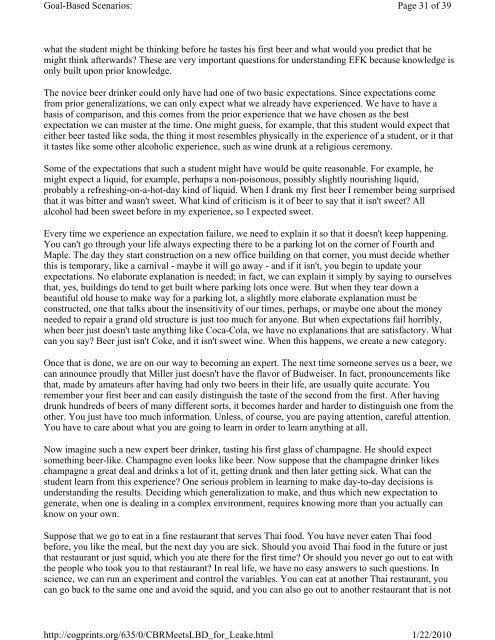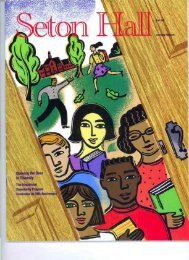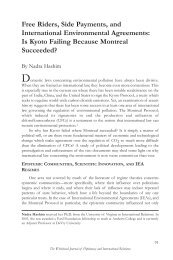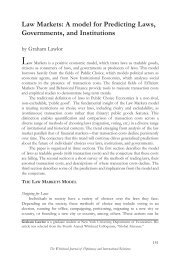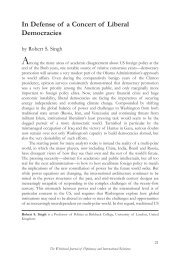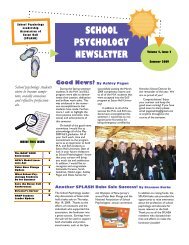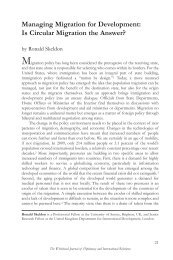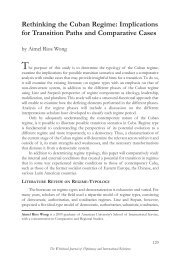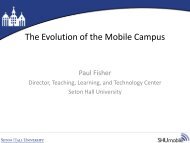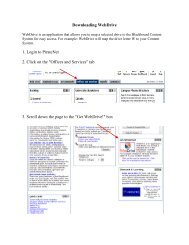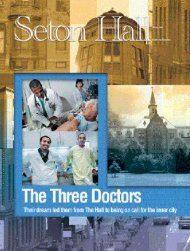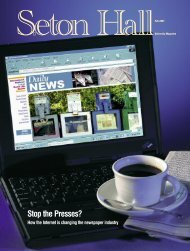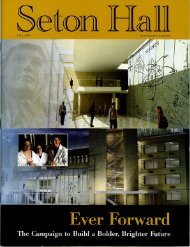Case-Based Reasoning Meets Learning by Doing
Case-Based Reasoning Meets Learning by Doing
Case-Based Reasoning Meets Learning by Doing
You also want an ePaper? Increase the reach of your titles
YUMPU automatically turns print PDFs into web optimized ePapers that Google loves.
Goal-<strong>Based</strong> Scenarios:<br />
Page 31 of 39<br />
what the student might be thinking before he tastes his first beer and what would you predict that he<br />
might think afterwards? These are very important questions for understanding EFK because knowledge is<br />
only built upon prior knowledge.<br />
The novice beer drinker could only have had one of two basic expectations. Since expectations come<br />
from prior generalizations, we can only expect what we already have experienced. We have to have a<br />
basis of comparison, and this comes from the prior experience that we have chosen as the best<br />
expectation we can muster at the time. One might guess, for example, that this student would expect that<br />
either beer tasted like soda, the thing it most resembles physically in the experience of a student, or it that<br />
it tastes like some other alcoholic experience, such as wine drunk at a religious ceremony.<br />
Some of the expectations that such a student might have would be quite reasonable. For example, he<br />
might expect a liquid, for example, perhaps a non-poisonous, possibly slightly nourishing liquid,<br />
probably a refreshing-on-a-hot-day kind of liquid. When I drank my first beer I remember being surprised<br />
that it was bitter and wasn't sweet. What kind of criticism is it of beer to say that it isn't sweet? All<br />
alcohol had been sweet before in my experience, so I expected sweet.<br />
Every time we experience an expectation failure, we need to explain it so that it doesn't keep happening.<br />
You can't go through your life always expecting there to be a parking lot on the corner of Fourth and<br />
Maple. The day they start construction on a new office building on that corner, you must decide whether<br />
this is temporary, like a carnival - maybe it will go away - and if it isn't, you begin to update your<br />
expectations. No elaborate explanation is needed; in fact, we can explain it simply <strong>by</strong> saying to ourselves<br />
that, yes, buildings do tend to get built where parking lots once were. But when they tear down a<br />
beautiful old house to make way for a parking lot, a slightly more elaborate explanation must be<br />
constructed, one that talks about the insensitivity of our times, perhaps, or maybe one about the money<br />
needed to repair a grand old structure is just too much for anyone. But when expectations fail horribly,<br />
when beer just doesn't taste anything like Coca-Cola, we have no explanations that are satisfactory. What<br />
can you say? Beer just isn't Coke, and it isn't sweet wine. When this happens, we create a new category.<br />
Once that is done, we are on our way to becoming an expert. The next time someone serves us a beer, we<br />
can announce proudly that Miller just doesn't have the flavor of Budweiser. In fact, pronouncements like<br />
that, made <strong>by</strong> amateurs after having had only two beers in their life, are usually quite accurate. You<br />
remember your first beer and can easily distinguish the taste of the second from the first. After having<br />
drunk hundreds of beers of many different sorts, it becomes harder and harder to distinguish one from the<br />
other. You just have too much information. Unless, of course, you are paying attention, careful attention.<br />
You have to care about what you are going to learn in order to learn anything at all.<br />
Now imagine such a new expert beer drinker, tasting his first glass of champagne. He should expect<br />
something beer-like. Champagne even looks like beer. Now suppose that the champagne drinker likes<br />
champagne a great deal and drinks a lot of it, getting drunk and then later getting sick. What can the<br />
student learn from this experience? One serious problem in learning to make day-to-day decisions is<br />
understanding the results. Deciding which generalization to make, and thus which new expectation to<br />
generate, when one is dealing in a complex environment, requires knowing more than you actually can<br />
know on your own.<br />
Suppose that we go to eat in a fine restaurant that serves Thai food. You have never eaten Thai food<br />
before, you like the meal, but the next day you are sick. Should you avoid Thai food in the future or just<br />
that restaurant or just squid, which you ate there for the first time? Or should you never go out to eat with<br />
the people who took you to that restaurant? In real life, we have no easy answers to such questions. In<br />
science, we can run an experiment and control the variables. You can eat at another Thai restaurant, you<br />
can go back to the same one and avoid the squid, and you can also go out to another restaurant that is not<br />
http://cogprints.org/635/0/CBR<strong>Meets</strong>LBD_for_Leake.html<br />
1/22/2010


